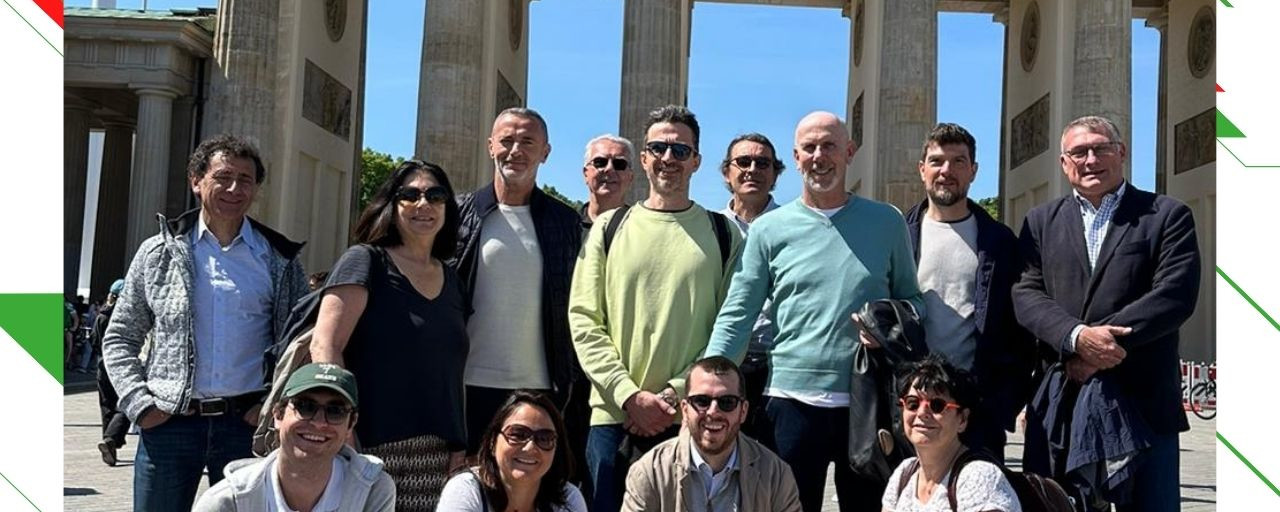IAG Innovation Trips’ secret recipe involves a group of professional business angels, a number of focused meetings with key players of a leading VC ecosystem, an open mind and tons of curiosity. After two stimulating deep dives into the Israeli and the Silicon Valley VC landscapes in the last two years, the group chose the European startup capital by definition as its destination for 2024.
Besides ranking first in EU in terms of number of VC investment in the first trimester of 2024, the German ecosystem - with Berlin as its epicenter - has a fascinating history that makes its VC market truly unique and an incredible example of resilience. Overcoming the post-war crisis after the fall of the wall, Berlin has emerged as a key innovation hub worldwide, attracting investors and talents from around the world, like only few cities were able to do. How did they do it?
One of the key factors was much simpler than one could imagine: a strongly competitive real estate market, compared to other European capitals, which made it an appealing destination for talents from all over the world. The brain gain and skilled labor influx to Berlin led to the first success stories, such as the famous “Rocket Internet” model: importing business models after they have proved successful in other countries, and adapting them to fit the context of the German capital. And right there, the chain reaction was triggered: Rocket Internet example fostered the birth of new companies. Their success created significant value for both investors and founders. The VCs kept investing in the market. The founders gained invaluable experiences which allowed them to launch new companies. Some of their employees started launching their companies as well. Berlin became attractive for new entrepreneurs and investors. And the virtuous cycle began.
Today, the Berlin ecosystem has gone a long way from there, and IAG group took a really good picture of it earlier this month.
Starting from the pre-pre-seed phase (not a typo!): supporting founders pre-startup, pre-idea, pre-everything is key to generating new businesses. And the German players know very well how to do that.
EWOR for instance, considered by many the European YC, positioned itself somewhere in between a master in entrepreneurship and a Venture Capital player, by investing up to 150k € and connecting their batch of aspiring entrepreneurs with founders of unicorns for hands-on trainings. Antler made the belief that exceptional founders can come from anywhere and from any background their flagship, and it keeps birthing hundreds of successful startups in over 30 hubs around the globe. How do they do it? With a clear and simple strategy: providing founders with team matchmaking and standardized processes and letting them focus on value creation. Which goes in the same direction as
HEARTFELT_ motto: “The best way to support startups is NOT to tell them what to do”. In other words: the line between micromanaging and empowering entrepreneurs through your know-how can be very thin. Make sure you allow your founders to lead.
Another fascinating element of the Berlin VC scene is there seems to be a special ability to recognize a tech trend before it even becomes one. Merantix proved this by building an impressive AI ecosystem (with over 700 people working on AI) before it became a hot topic, with a visionary idea in mind that Europe would have its own AI strategy and its main assets would be proprietary models and niche databases.
If it’s intriguing to see the latest bets on new tech, it is maybe even more interesting to witness the evolution of more historical players in the ecosystem and find out what their secret for long-term success is. Just to name a few, b2venture, born as a syndicate of business angels from St.Gallen, is now one of the most important players in Germany with investments in successful companies like DeepL, SumUp, and Facebook, and over € 800M under management. The evolution from a group of business angels to a top-notch Venture Capital fund seems challenging, but they surely did it right.
What is also distinctive about Berlin’s ecosystem, is how most players have found a truly unique way of positioning themselves and become attractive for experienced founders. Cavalry, for instance, currently in the process of raising their third fund of €120M, is one of the most active early-stage funds in Europe, leveraging on their continuous support to the founders of the startups in their portfolio, with an operational team mainly dedicated to supporting them. The two pan-European funds Atlantic Labs (focused on frontier technologies) and FoodLabs (leader in Europe in the food and climate sector), have invested in over 160 startups since 2011, both offering tangible support to founders through a dedicated platform approach. Building a community that can create actual value for founders, is essential to establish an attractive market positioning and make sure to attract the best investments opportunities.
JOIN Capital, with its second fund of €120 million and an office in Milan as well, focuses on industrial deep tech, highlighting the importance of creating connections with industrial players - which led to their choice to set up a base in Italy. This way, they can help technical founders lay the groundwork, while entrepreneurial teams drive scaling. Lastly, Square One, dedicated to seed and pre-seed investments in the B2B sector, chose to focus on solving complex problems with an efficient and fast decision-making process.
Germany’s VC market is more developed and has a higher competition level than Italy, which led each of these funds to learn to find their own strong and unique positioning to be among the first ones to get to the best deals. This means, Italian VCs should step up their game and do the same, if they want to be competitive at an international level.
An interesting approach to CVC emerges as well, with the successful example of Delivery Hero Ventures, the corporate venture capital arm of the unicorn in the grocery sector, which invests in B2B and Fintech sectors globally. They have managed to demonstrate how one of the largest European scale-ups can maintain its positioning over time by becoming a first-class Corporate Venture Capital operator.
Last but not least, Berlin is blessed with some of the giants of the seed stage: Earlybird, the early-stage fund founded in 1997 with €2 billion in assets under management and over 35 exits, and HV Capital, the German multi-stage VCs which ranked 3rd in Europe for returns, with more than 230 investments such as Zalando, Sumup, and FlixBus. Both have an incredibly successful track record in using a solid data-driven approach to select the best founders, and investing in tech trends before they peak.
This time in Berlin was like diving headfirst into a treasure chest of wisdom! The IAG group soaked up lessons on the power of a supportive community and the magic that happens when collaboration and innovation take center stage in venture capital. It was a real eye-opener, reminding us how vital it is to learn from the best and to nurture strong bonds within the international VC scene, to come back home and keep building something amazing for the Italian ecosystem too.








